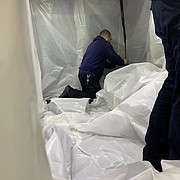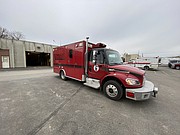Preparing for coronavirus
BONNERS FERRY — With the coronavirus, COVID-19, continuing to spread and nine deaths reported in the U.S. as of Tuesday, Boundary Ambulance has taken action to prepare for the possibility of cases in Boundary County.
Boundary Ambulance took its Unit 4 ambulance, a 2007 Freightliner, that is not used during the winter due to it being two-wheel drive, and turned it into an infectious disease transport unit, as part of its total preparedness efforts for the new coronavirus.
“This is an idea we saw other ambulance agencies doing during the Ebola outbreak several years ago,” said Boundary Ambulance Paramedic and Captain of Operations, Drew Rinella. “The goal is to limit contamination within the ambulance’s patient compartment by sealing it off with clear plastic sheeting.”
By limiting contamination, it will allow the ambulance crew to decontaminate the ambulance between calls and respond to the next call with greater speed and safety.
“This is a larger task than it would initially appear,” Rinella said. “Thankfully, we had some guidance from documents created by Omaha Fire Department during the Ebola outbreak.”
After a few attempts, the ambulance crew developed their own system, incorporating adhesive Command Hooks along the top edge of the walls and attaching plastic sheeting to them using homemade duct tape grommets to reinforce the connection.
“Sorry, but if you tried to buy Command Hooks last week and couldn’t find any in town, that was our fault,” Rinella said.
The hooks may serve a dual purpose once they no longer require an infectious disease transport unit.
“Once the coronavirus threat has passed, we can easily remove the hooks, although I’ve never met a paramedic who complained about having too many places to hang an IV bag, so we may just leave them in place,” Rinella said.
Gorilla tape was used next to seal all edges and around the hole that were cut into the plastic for the atmospheric system and exhaust fan. One of the seats was unbolted and removed in order to facilitate the coverage of the plastic sheeting.
“Some creativity with zip ties allowed us to line the ceiling of the ambulance with plastic, which is something you didn’t typically see agencies doing back during the ebola outbreak because it’s challenging, and because Ebola isn’t airborne,” Rinella said.
Covering the ceiling is a crucial step in preventing the spread of the coronavirus, as all interior surfaces need to be protected from respiratory droplets that can come from the patient coughing or sneezing.
In addition to limiting contamination of the ambulance surfaces with the plastic sheeting, the ambulance will also undergo a high level decontamination process. They will utilize a device called the AMBUstat fogger, which was developed by NASA.
The fogger creates a mist with a solution that consists of water, peracetic acid and hydrogen peroxide, which are both excellent disinfectants. Mixed together in a solution it tends to be more stable and work at lower concentrations.
“Following treatment with the AMBUstat fogger, the ambulance will receive a thorough surface decontamination with our standard health care grade disinfectants, which are rated to kill coronaviruses within 30 seconds,” Rinella said. “If we are called to transport a patient with confirmed coronavirus using our infectious disease transport unit, Boundary County residents should not fear riding in our ambulance later after it is returned to normal 911 service.”
According to Rinella, the CDC has issued new guidance that coronavirus spread within the U.S. is inevitable, and stated that communities should take action to prepare for “significant disruption” caused by this contagion.
In preparation, Boundary Ambulance has also prepared by stocking up on personal protective equipment and respiratory medications.
“We hope our infectious disease transport unit will never be needed, however we are prepared to serve if the coronavirus hits us here at home,” Rinella said.





